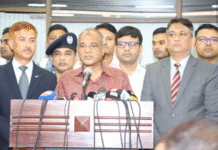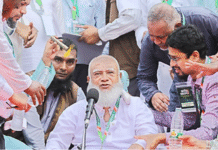
GEORGE TOWN: Countries cannot deport refugees to their country of origin as it would run afoul of international law, according to the United Nations High Commissioner for Refugees (UNHCR).
It was commenting on the arrest and looming deportation of former Bangladeshi envoy to Malaysia, Mohamed Khairuzzaman.
“This principle is recognised as customary international law which is binding on all states, regardless of whether or not they have signed the 1951 convention relating to the status of refugees,” it said when asked to comment on Khairuzzaman’s situation.

Khairuzzaman, 65, a UNHCR cardholder on political asylum in Malaysia since 2009, was picked up by an undisclosed enforcement agency on Wednesday at his home in Ampang.
He was appointed as high commissioner to Malaysia in 2007. Two years later, he was recalled to Bangladesh after a change of government. He refused to return and has remained in exile in Malaysia ever since.
The reasons behind Khairuzzaman’s arrest are still unknown. Bangladeshi media outlets have speculated that his arrest was related to the 1975 “jail killings” in Dhaka, for which government officials there have said he should be brought back to face charges.
Khairuzzaman served almost four years in detention in 1996 without trial in his home country for the alleged killings, and was regarded as a political prisoner by Amnesty International.
Lawyer M Ramachelvam said the power given under the extradition law was not a carte blanche to deport people, especially for political reasons.
He said the strict requirements under the Extradition Act 1992 had to be complied with, and in the case of the former envoy, as a refugee he could not be sent back to his country of origin.
“The government should not send back a person if he faces a threat to his life or liberty due to his race, religion or political alignment,” the Bar Council migrants, refugees and immigration affairs committee co-chair said.
Separately, Human Rights Watch (HRW) urged Malaysia to cooperate with the United States to expedite Khairuzzaman’s application for permanent residency so as to enable him to join his wife and son who are based there.
Earlier, Khairuzzaman’s wife, Rieta Rahman, said the US had approved his Green Card application but it was pending a security verification by the Malaysian police, which was refused despite several attempts.
HRW Asia deputy director Phil Robertson said Khairuzzaman would face arrest, abuse in custody and persecution in his home country if he was deported.
“The best way forward at this point would be to release him immediately and facilitate third-country resettlement for him to join his family in the US.
“We have seen time and time again the vindictive, rights-abusing behaviour of Bangladesh prime minister Sheikh Hasina and her government who vengefully pursue political opponents for any perceived slight in the past,” he said in an email to FMT.










